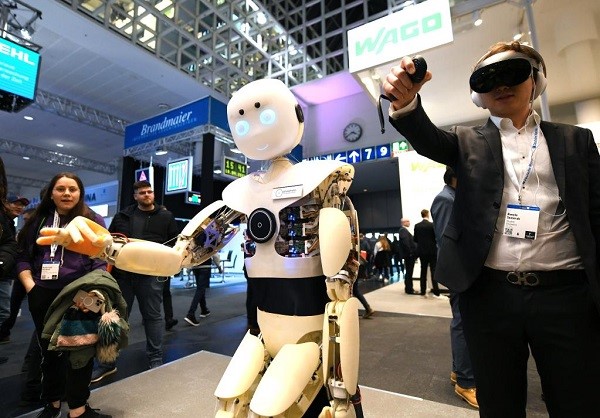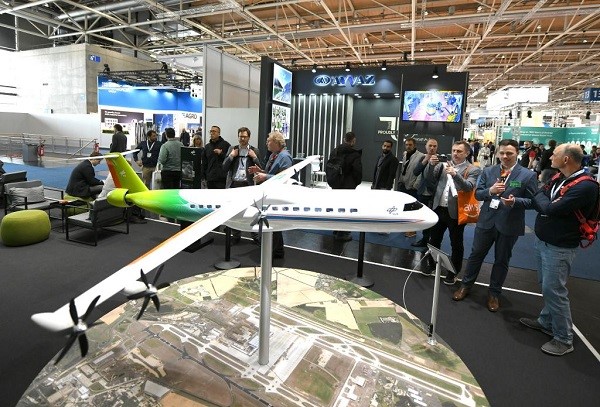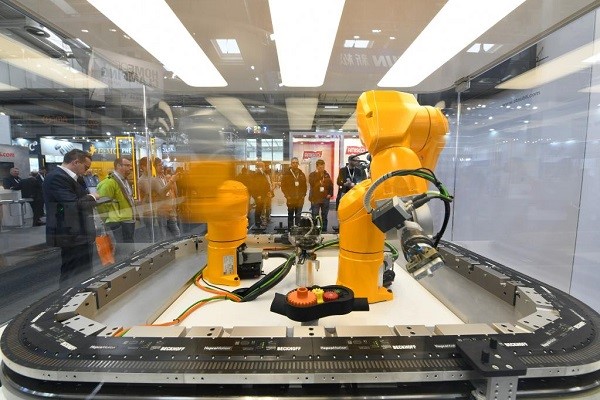
- Home
- Media Center
-
Events
- Wuzhen Summit
- Regional Forums
- Practice Cases of Jointly Building a Community with a Shared Future in Cyberspace
- World Internet Conference Awards for Pioneering Science and Technology
- The Light of Internet Expo
- Straight to Wuzhen Competition
- Global Youth Leadership Program
- WIC Distinguished Contribution Award
- Membership
- Research & Cooperation
- Digital Academy
-
Reports
- Collection of cases on Jointly Building a Community with a Shared Future in Cyberspace
- Collection of Shortlisted Achievements of World Internet Conference Awards for Pioneering Science and Technology
- Reports on Artificial Intelligence
- Reports on Cross—Border E—Commerce
- Reports on Data
- Outcomes of Think Tank Cooperation Program
- Series on Sovereignty in Cyberspace Theory and Practice
- Other Achievements
- About WIC
- 中文 | EN

Hannover Messe 2023 demonstrates three development trends for manufacturing industry
Against the backdrop of multiple global challenges, the future development of the global manufacturing industry is being shaped by emerging technologies and new materials, with traditional production methods being overturned.
Hannover Messe, the German industrial expo, is an important platform for exhibiting industrial design, manufacturing and application trends as well as promoting international trade. In addition to attracting numerous exhibitors, the Hannover Messe 2023 also offers opportunities for experts and industry insiders to hold in-depth discussions on the latest development trend of industrial technologies.
AI has become a norm for future industrial manufacturing
It is evident that many cutting-edge AI technologies shown at the expo are being applied in practice.
“AI has not only become a development trend, but also a norm for the whole industry,” said a tech expert from Festo, a famous German automation company, noting that the company’s large-scale bio-mass manufacturing project has used the AI technology to detect the growth status of cells.

A smart robot imitates a man’s body movement at the German Hannover Messe expo on April 18. [Ren Pengfei/Xinhua]
In the past few years, AI was seen more as a newly-developed technology, but it is obvious that at this expo, AI is being applied to every aspect of industries on a large scale.
Jochen Kockler, CEO of Deutsche Messe AG, stated that one of the most popular trends that people have paid attention to at this expo is AI application in such areas as automation tasks, improving quality control and optimizing production plans in the manufacturing industry.
However, industry experts also noted that the AI application in display is still in the primary stages, which means that the large-scale application of AI across the whole industry may still take a long time.
It may take two more years for the manufacturing industry to enter the AI era, says an expert from Google.
Many experts agreed that the key for the future development of AI is to strengthen cooperation to effectively use data and avoid new gaps in technology.
Industry insiders suggest that the industrial application of AI lies in its combination with mathematics, statistics and the neural network.
Sustainability becomes the key factor for the transformation of the manufacturing industry
“Industrial de-carbonization has never been more important than it is today. This means that every company has an obligation to reduce carbon emissions, and cooperation is of utmost importance throughout the process,” said Anne-Laure Parrical de Chammard, Member of the Executive Board of Siemens Energy AG.
The industrial sector is undertaking multiple methods to tackle climate change, such as waste heat recycling, the utilization of hydrogen energy, the use of biomass, carbon capturing, energy efficiency improvement and the establishment of a circular economy. With the public paying more attention to energy saving and environmental protection, relevant commitments from manufacturing companies can also increase their competitiveness.

People look at a plane model using hydrogen energy at the German Hannover Messe on April 17. [Ren Pengfei/Xinhua]
In addition, with emerging technology playing a larger role, it is possible that companies will use algorithm to predict energy consumption and reduce their carbon footprint.
Many participating experts noted that sustainability has become the core topic of the manufacturing industry, which means that it must go through transformation so as to realize the relevant goals in reducing global carbon emissions. The expo sponsors noted that carbon emission by energy-intensive companies accounts for thirty percent of the global total. For them, de-carbonization can be an arduous task as this transformation means a huge cost. In the long term, it could have an invaluable outcome.
“Industry 4.0” enters another development stage
The term “industry 4.0” first appeared at the Hannover Messe 2011. Entering its second decade, the concept has developed new visions. Experts think that with the change in international climate, emerging technology application will undergo exponential growth, meaning that “industry 4.0” may enter another development stage.

Visitors watch a smart robotic arm at the German Hannover Messe expo on April 18. [Ren Pengfei/Xinhua]
“Industry 4.0” offers a new mode of thinking for the industry and companies should think of their development path with open minds. They need to cooperate with and learn from each other in the development of new products, allow new ventures and new industries to be involved in the development. Moreover, they should enhance coordination within the company by integrating their businesses with research and development.
Companies are more enthusiastic about automation and digitalization in the process of industrialization. AI, robot learning, Industrial Internet of Things, 3D printing and 5G are being incorporated more and more into the concept of “industry 4.0”.
However, “industry 4.0” still faces many challenges. The sponsors of the expo pointed out that for small- and medium-sized enterprises, they need solutions that can work immediately. They are currently hesitant about emerging technologies, as they have not seen any sound evidence of the technologies’ performance.
Many experts also believed that in the second decade of “industry 4.0”, China and other emerging economies are expected to play an increasingly important role.

The World Internet Conference (WIC) was established as an international organization on July 12, 2022, headquartered in Beijing, China. It was jointly initiated by Global System for Mobile Communication Association (GSMA), National Computer Network Emergency Response Technical Team/Coordination Center of China (CNCERT), China Internet Network Information Center (CNNIC), Alibaba Group, Tencent, and Zhijiang Lab.





